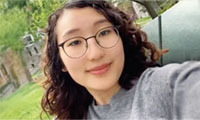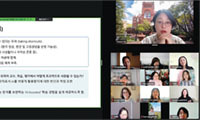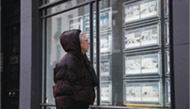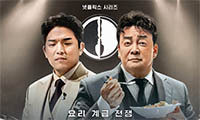▶ FRANK BRUNI
Does it call for smearing people on the basis of flimsy conspiracy theories? That’s what Bachmann just did to Huma Abedin, an aide to Secretary of State Hillary Clinton, by essentially suggesting she might be a mole for the Muslim Brotherhood.
Does it endorse scaring young women away from immunizations that could spare them serious illness? Bachmann did that during her memorable presidential campaign, when she blithely drew an unsubstantiated link between a vaccine for the human papillomavirus and mental retardation.
Does it encourage gratuitously divisive condemnations of Barack Obama as “anti-American,” one of many incendiary phrases in her attacks against him in 2008? And does it compel a war against homosexuality waged with the language and illogic she uses?
She has said that gay men and lesbians are dysfunctional products of abuse and agents of “sexual anarchy,” and when the singer and songwriter Melissa Etheridge was battling breast cancer years ago, Bachmann helpfully chimed in: “This may be an opportunity for her now to be open to some spiritual things, now that she is suffering with that physical disease. She is a lesbian.”
Bachmann’s concept of Christian love brims with hate, and she has a deep satchel of stones to throw. From what kind of messiah did she learn that?
Over recent days she has drawn attention for the letter that she and four other Republican lawmakers sent to federal intelligence and security agencies last month. It expressed fears that the Muslim Brotherhood might be infiltrating the government, and it mentioned Abedin. She’s Muslim, after all.
My aim here isn’t to re-litigate Bachmann’s crimes against reason and decency, all widely documented.
It’s to wonder why we accept her descriptions of herself, and in turn describe her, as a deeply religious woman. That grants too much credence to her particular, peculiar and highly selective definition of piety. And it offends the many admirable people of faith whose understanding and practice of religion aren’t, like hers, confrontational and small-minded.
Bachmann is an evangelical, and has spoken rhapsodically about the experience of being born again. After that moment, she said, “I absolutely understood sin, and I wanted no part of it.” She plunged into politics nonetheless.
We routinely place her in the “religious right,” a phrase that frustrates me, tidily linking a certain set of political beliefs with profound devotion. We talk much less frequently of any “religious left,” and that disparity implies that a seriously faithful person is most likely to land on just one end of the political spectrum.
Tell that to the Nuns on the Bus, who rolled across the country last month focusing on social welfare and expressing alarm about the impact that cuts in federal spending might have on struggling Americans. Their politics line up more neatly with liberal than conservative policies, but the nuns reflect a Catholicism no less true or widespread than that of the bishops carrying on about gay marriage and birth control.
Speaking of gay marriage, both the Reform and Conservative branches of Judaism in this country have embraced it, and the Episcopal Church in the United States has developed a special blessing for same-sex couples. Leaders of these denominations would tell you not that they’re flouting Judeo-Christian tradition but that they’re doing full justice to their faiths, which hinge on more than reflexive fidelity to chosen passages from ancient writings. They hinge on the human intellect and its ability to filter timeless values through modern understanding.
Because he’s a social liberal, Cory Booker, the Newark mayor, is seldom mentioned in terms of religion, but it turns out that he’s made a study of the Bible, as well as other sacred texts, and given considerable thought to faith. On his Facebook page a few months ago, he mused thusly:
“Before you speak to me about your religion, first show it to me in how you treat other people. Before you tell me how much you love your God, show me in how much you love all His children.”
I know many progressive, big-hearted Christians who rise to that challenge, and it’s wrong for a single Christian label — without asterisk or annotation — to be attached both to them and to the likes of Bachmann.
So maybe it’s time for annotations. Most of us distinguish, rightly, between Muslim extremists and other followers of Islam. Perhaps we should start noting the difference between Christians of real compassion and those of exclusionary spite.
Bachmann’s on to something: dangerous fundamentalists have indeed set up camp deep inside the capital. She can find one in her office. She need only look in the mirror.
스마터리빙
more [ 건강]
[ 건강]이제 혈관 건강도 챙기자!
[현대해운]우리 눈에 보이지 않기 때문에 혈관 건강을 챙기는 것은 결코 쉽지 않은데요. 여러분은 혈관 건강을 유지하기 위해 어떤 노력을 하시나요?
 [ 건강]
[ 건강]내 몸이 건강해지는 과일궁합
 [ 라이프]
[ 라이프]벌레야 물럿거라! 천연 해충제 만들기
 [ 건강]
[ 건강]혈압 낮추는데 좋은 식품
[현대해운]혈관 건강은 주로 노화가 진행되면서 지켜야 할 문제라고 인식되어 왔습니다. 최근 생활 패턴과 식생활의 변화로 혈관의 노화 진행이 빨라지고
사람·사람들
more많이 본 기사
- 성탄절 캘리포니아 이틀째 악천후…최소 2명 사망
- “여객기서 빈대 물렸다” 美·유럽 항공사 상대 억대 손배소
- “美 J1비자 ‘현대판 노예’ 사례 속출”…韓대학생 “정화조 청소만”
- 尹 내란재판 첫 구형 나온다…오늘 체포방해 혐의 결심공판
- 맘다니 뉴욕시장 취임위원회에 ‘파친코’ 이민진 작가
- 트럼프 얹은 케네디센터 개명 싫어 연례 성탄콘서트 취소
- “마가, 유럽에 첫 공격”…표현의 자유 둘러싼 전쟁 시작됐나
- 잘나가던 백종원, 논란에 흔들.. ‘흑백요리사2’ 복귀로 웃을까?
- “베네수 마두로, 美 군사위협을 반체제 인사 탄압에 활용”
- 중앙정치 실망한 美공화 하원의원들 내년 주지사 선거 출마 러시
- 올해도 우울한 우크라 성탄…러 공격 지속에 종전 기대감도 저조
- 여성 살해·자녀 납치 한인 ‘수배’
- 교황, 첫 성탄 메시지서 “우크라전 종전 직접 대화할 용기 찾길”
- 쿠팡 유출 한달 만에 용의자 특정…동기·2차피해는 여전히 베일
- 박나래, 과거 또 파묘..이번엔 ‘나혼산’ 18L 식용유 장면
- [2025년 한 해 ‘진 별’들] 미주 한인사회 원로들 ‘역사의 뒤안길’로
- 이스라엘군 “레바논서 이란 정예부대 군인 사살”
- 우크라, 성탄절에 드론·英미사일로 러 에너지시설 공격
- 러 “푸틴, 트럼프에 ‘메리 크리스마스’…젤렌스키는 야만적”
- 트럼프, 성탄절 어린이들과 통화… “나쁜 산타 막을게”
- “대학 학자금 상환 안하면 임금 압류한다”
- 한인타운 한복판 주유소서 강도 ‘칼부림’
- 남가주 전역에 ‘물폭탄’… 성탄 연휴 ‘대혼란’
- “소변 불편한데 주저하다 방광 망가져”
- 북가주목회자 사모회 총회
- [송년 행사] LA 코리아타운 라이온스클럽
- 테슬라, “비상사태 시 차문 안 열려”
- 월드미션칼리지 장학금 수여식
- 크리스마스 연휴 음주운전 ‘꼼짝마’
- 서태지, 딸·엘리와 1년 만에 근황 “좋은 소식 없어 안타까워”
- 체포 불체자 수만명 물류창고에 수감 추진
- 한인 박찬영씨 총격살해범은 백인 군인...살해범 “박씨 차량이 끼어들어 시비가 붙어 결국 총쐈다”
- H-1B ‘10만 달러 수수료’ 연방법원, 이의소송 기각
- ‘라스베가스에서 만난 한인들’
- VA 페어팩스 카운티 실업자 급증
- SF기독대학교’동문의 밤’
- 북한인, 아마존 위장취업 대거 적발
- 원·달러 환율, 당국 개입에 42원 폭락
- [스티브 강 ‘인사이드 미국’] 2026 중간선거: 트럼프 지지율 하락이 말해주는 것
- 서유리, ♥법조계 남친 데이트 신청에 두근.. “돈은 내가 낸다”
- LA 마약조직 집중 단속 갱단원 등 수백명 체포
- 워싱턴 총신동문회, 새 회장에 김찬영 목사
- 최준희, 엄마 故최진실 생일 맞아 추억 “우리 마미 축하”
- “음주운전 대신 15불 할인하는 리프트 타세요”
- CBS가 보류한 ‘불법체류자 추방’ 보도, 캐나다서 원본 유출
- [송년 행사] LA 북부한인회
- 봉사 가치 되새기고 발전 방안 모색
- “불교계 화합과 차세대 육성 축제”
- 난방기 뜯자 ‘비밀공간’ 은신 마피아 보스 체포
- 중산층이 집을 사지 않는다?… 챗GPT가 내다본 주택시장 미래
1/5지식톡

-
 미 육군 사관학교 West Poin…
0
미 육군 사관학교 West Poin…
0https://youtu.be/SxD8cEhNV6Q연락처:wpkapca@gmail.comJohn Choi: 714-716-6414West Point 합격증을 받으셨나요?미 육군사관학교 West Point 학부모 모…
-
 ☝️해외에서도 가능한 한국어 선생님…
0
☝️해외에서도 가능한 한국어 선생님…
0이 영상 하나면 충분합니다!♥️상담신청문의♥️☝️ 문의 폭주로 '선착순 상담'만 진행합니다.☎️ : 02-6213-9094✨카카오톡ID : @GOODEDU77 (@골뱅이 꼭 붙여주셔야합니다…
-
 테슬라 자동차 시트커버 장착
0
테슬라 자동차 시트커버 장착
0테슬라 시트커버, 사놓고 아직 못 씌우셨죠?장착이 생각보다 쉽지 않습니다.20년 경력 전문가에게 맡기세요 — 깔끔하고 딱 맞게 장착해드립니다!장착비용:앞좌석: $40뒷좌석: $60앞·뒷좌석 …
-
 식당용 부탄가스
0
식당용 부탄가스
0식당용 부탄가스 홀세일 합니다 로스앤젤레스 다운타운 픽업 가능 안녕 하세요?강아지 & 고양이 모든 애완동물 / 반려동물 식품 & 모든 애완동물/반려동물 관련 제품들 전문적으로 홀세일/취급하는 회사 입니다 100% …
-
 ACSL 국제 컴퓨터 과학 대회, …
0
ACSL 국제 컴퓨터 과학 대회, …
0웹사이트 : www.eduspot.co.kr 카카오톡 상담하기 : https://pf.kakao.com/_BEQWxb블로그 : https://blog.naver.com/eduspotmain안녕하세요, 에듀스팟입니다…
케이타운 1번가
오피니언
 스티브 강 전 한인민주당협회 회장
스티브 강 전 한인민주당협회 회장 [스티브 강 ‘인사이드 미국’] 2026 중간선거: 트럼프 지지율 하락이 말해주는 것
 김홍일 케이유니콘인베스트먼트 대표
김홍일 케이유니콘인베스트먼트 대표 [기고] 안정의 기준은 어떻게 제도가 되었나
 유혜미 한양대 경제금융대학 교수
유혜미 한양대 경제금융대학 교수 [유혜미 칼럼] 치솟는 환율, 경제 지표의 역설
 성민희 소설·수필가
성민희 소설·수필가 [윌셔에서] 우리 안의 ‘생각하는 사람’을 깨울 시간
 김정곤 / 서울경제 논설위원
김정곤 / 서울경제 논설위원 [만화경] 해수부 부산시대

[왈가 왈부] 내란재판부·정통망법 또 수정… 졸속·땜질 아닌가요
 정숙희 논설위원
정숙희 논설위원온라인쇼핑과 반품, 그리고 그 이후
 파리드 자카리아 / 워싱턴포스트 칼럼니스트 / CNN ‘GPS’ 호스트
파리드 자카리아 / 워싱턴포스트 칼럼니스트 / CNN ‘GPS’ 호스트 트럼프의 새 독트린 “미국을 다시 왜소하게”
 김동찬 시민참여센터 대표
김동찬 시민참여센터 대표 [미국은 지금] MAGA의 분열, 예견된 균열의 시작
1/3지사별 뉴스

“온 세상에 평화를⋯”
숨가쁘게 달려온 2025년을 이제 1주일 남짓 남긴 채 크리스마스 이브를 맞는다. 다사다난했던 한 해를 되돌아보며 마무리하는 연말 시즌과 크리…
H-1B비자 고임금·경력자에 우선권

“한반도 평화정착에 앞장선다”
민주평화통일자문회의 미주지역회의(부의장 이재수)는 22일 기자회견을 통해 내년도 활동 방향과 목표를 밝혔다. 이재수 부의장은 “미주지역회의는…
VA 페어팩스 카운티 실업자 급증

한인들 위한 무료 법률 상담회 개최
샌프란시스코 베이지역 한인회(회장 김한일)는 지난 20일 한인회관에서 북가주 지역 한인들을 위한 무료 법률 상담회를 개최했다. 이날 행사에는 …
여성 살해·자녀 납치 한인 ‘수배’

오늘 하루 이 창 열지 않음 닫기 





















































.png)


댓글 안에 당신의 성숙함도 담아 주세요.
'오늘의 한마디'는 기사에 대하여 자신의 생각을 말하고 남의 생각을 들으며 서로 다양한 의견을 나누는 공간입니다. 그러나 간혹 불건전한 내용을 올리시는 분들이 계셔서 건전한 인터넷문화 정착을 위해 아래와 같은 운영원칙을 적용합니다.
자체 모니터링을 통해 아래에 해당하는 내용이 포함된 댓글이 발견되면 예고없이 삭제 조치를 하겠습니다.
불건전한 댓글을 올리거나, 이름에 비속어 및 상대방의 불쾌감을 주는 단어를 사용, 유명인 또는 특정 일반인을 사칭하는 경우 이용에 대한 차단 제재를 받을 수 있습니다. 차단될 경우, 일주일간 댓글을 달수 없게 됩니다.
명예훼손, 개인정보 유출, 욕설 등 법률에 위반되는 댓글은 관계 법령에 의거 민형사상 처벌을 받을 수 있으니 이용에 주의를 부탁드립니다.
Close
x